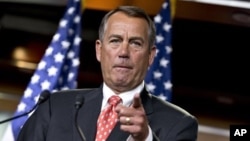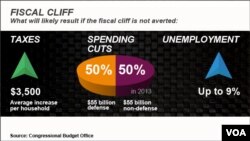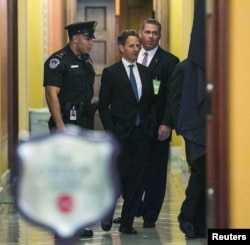WASHINGTON —
A stand-off persists between the Obama administration and congressional Republicans on a deficit reduction plan to replace massive automatic tax hikes and federal spending cuts that will go into effect January 1. No one is guaranteeing a deal will be struck before the end-of-year deadline.
With four weeks to go before a draconian austerity regime hits a fragile U.S. economy, Congress’ top Republican, House Speaker Boehner, conceded the United States may, in fact, step off the so-called “fiscal cliff”.
“There is clearly a chance. I am determined to solve our debt problem,” he said.
Boehner spoke on Fox News Sunday. On the same program, Treasury Secretary Timothy Geithner was asked if he could guarantee a deal will be struck before January 1.
“No, I cannot promise that," Geithner said. "That is a decision that lies in the hands of Republicans.”
Last week, Geithner met with congressional leaders to present the Obama administration’s plan to avert the fiscal cliff. The proposal calls for raising taxes on the wealthy, boosting infrastructure spending, extending federal jobless benefits, trimming costs from a government health-care program for retirees, and locking in projected savings from ending the war in Afghanistan.
“It was not a serious offer,” said Boehner. He added that the administration’s plan amounts to massive tax hikes with no real spending cuts.
“The president is asking for $1.6 trillion worth of new revenue over 10 years. He has stimulus spending that exceeded the amount of new cuts he is willing to consider," he said. "If we gave the president $1.6 trillion of new money, what do you think he would do with it? He is going to spend it. It is what Washington does.”
Secretary Geithner’s response? If Republicans want a different deal, they should make a counter-offer with the deeper spending cuts they would like to see.
“If Republicans would like to go beyond these reforms, or they want to do it differently, they should tell us how they want to do it,” he said.
Geithner said, if negotiations fail, it will be due to Republican inflexibility.
“The only reason it would happen is if a group of members of Congress decide they are going to block an agreement because they want to extend [lower] tax rates for the rich that we cannot afford,” Geithner said.
Republicans counter that what is blocking a deal is President Barack Obama’s insistence on boosting tax rates without substantial spending reduction commitments.
Speaker Boehner said negotiations are stalled. “Right now I would say we are nowhere. Period, we are nowhere,” he said.
Only one face-to-face meeting on the debt has been held between President Obama and congressional leaders since last month’s elections. White House and congressional staffers have been negotiating in the weeks since, attempting to narrow partisan differences.
America’s annual federal deficit exceeds $1 trillion, and the national debts stands at more than $16 trillion.
With four weeks to go before a draconian austerity regime hits a fragile U.S. economy, Congress’ top Republican, House Speaker Boehner, conceded the United States may, in fact, step off the so-called “fiscal cliff”.
“There is clearly a chance. I am determined to solve our debt problem,” he said.
Boehner spoke on Fox News Sunday. On the same program, Treasury Secretary Timothy Geithner was asked if he could guarantee a deal will be struck before January 1.
“No, I cannot promise that," Geithner said. "That is a decision that lies in the hands of Republicans.”
Last week, Geithner met with congressional leaders to present the Obama administration’s plan to avert the fiscal cliff. The proposal calls for raising taxes on the wealthy, boosting infrastructure spending, extending federal jobless benefits, trimming costs from a government health-care program for retirees, and locking in projected savings from ending the war in Afghanistan.
“It was not a serious offer,” said Boehner. He added that the administration’s plan amounts to massive tax hikes with no real spending cuts.
“The president is asking for $1.6 trillion worth of new revenue over 10 years. He has stimulus spending that exceeded the amount of new cuts he is willing to consider," he said. "If we gave the president $1.6 trillion of new money, what do you think he would do with it? He is going to spend it. It is what Washington does.”
Secretary Geithner’s response? If Republicans want a different deal, they should make a counter-offer with the deeper spending cuts they would like to see.
“If Republicans would like to go beyond these reforms, or they want to do it differently, they should tell us how they want to do it,” he said.
Geithner said, if negotiations fail, it will be due to Republican inflexibility.
“The only reason it would happen is if a group of members of Congress decide they are going to block an agreement because they want to extend [lower] tax rates for the rich that we cannot afford,” Geithner said.
Republicans counter that what is blocking a deal is President Barack Obama’s insistence on boosting tax rates without substantial spending reduction commitments.
Speaker Boehner said negotiations are stalled. “Right now I would say we are nowhere. Period, we are nowhere,” he said.
Only one face-to-face meeting on the debt has been held between President Obama and congressional leaders since last month’s elections. White House and congressional staffers have been negotiating in the weeks since, attempting to narrow partisan differences.
America’s annual federal deficit exceeds $1 trillion, and the national debts stands at more than $16 trillion.






